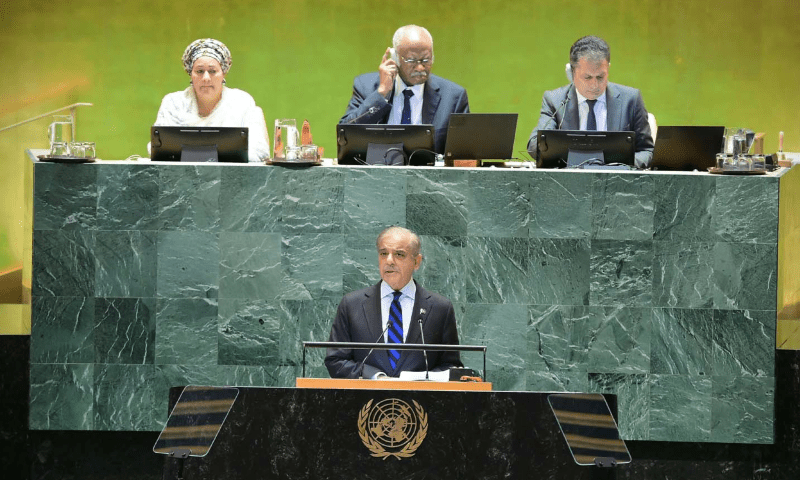
[ad_1]

• Demands global action on held Kashmir, Palestine; says Israel’s illegal occupation creates ‘fresh hell’ daily
• Walks out to protest Netanyahu’s speech, other Muslim leaders follow suit
• Speaks about Ukraine war, climate change, poverty; labels debt burdens a ‘death trap’
• PTI supporters hold demo to seek Imran’s release
UNITED NATIONS: Prime Minister Shehbaz Sharif delivered a forceful speech at the UN General Assembly on Friday, urging both Israel and India to halt targeting innocent Palestinians and Kashmiris.
Highlighting New Delhi’s threat to cross the Line of Control and occupy Azad Kashmir, the premier issued a stern warning to India.
“Let me state, in no uncertain terms, that Pakistan will respond most decisively to any Indian aggression,” PM Shehbaz asserted, his words emphasised by a firm thump on the rostrum.
In a significant move, the prime minister led his delegation in walking out of the Assembly as Israeli Prime Minister Benjamin Netanyahu began his speech, setting a precedent that other Muslim leaders followed.
PM Shehbaz, addressing the assembly in the presence of the Israeli leader, cautioned the international community that illegal occupations of Palestine and Kashmir were creating “fresh hell” daily.
“Netanyahu, who had to wait behind Shehbaz Sharif as the next speaker, witnessed firsthand the immediate response from Jordan, Palestine, Syria, and other Muslim nations,” noted Information Minister Attaullah Tarar. “Muslim seats were vacant when Netanyahu spoke.”
Outside the UN headquarters, PTI supporters held a small but vocal protest, demanding the immediate release of former prime minister Imran Khan.
The PM, however, remained focused on international concerns, avoiding domestic political issues, and instead criticising how New Delhi had “thoughtlessly” rejected Islamabad’s proposals for a mutual “strategic restraint regime”.
“Illegal occupation creates a fresh hell every day in the killing fields of Palestine and occupied Jammu and Kashmir. Can we turn a blind eye to the mothers cradling the lifeless bodies of their children?” PM Shehbaz asked.
“This is not just a conflict; it is the systematic slaughter of innocent people, an assault on the very essence of human life and dignity,” he added.
He further warned, “The blood of Gaza’s children stains the hands of not just the oppressors, but also those complicit in prolonging this cruel conflict.”
During his 21-minute address to the 193-member Assembly, the premier touched on a range of regional and international issues, including the disputes in Palestine and Kashmir, the Ukraine conflict, climate change, poverty, and the mounting debt burdens, particularly worsened by climate change.
He urged the global community to demand an immediate end to the bloodshed, working towards a durable peace through the establishment of a viable, secure, contiguous, and sovereign Palestinian state based on pre-1967 borders, with Al-Quds Al-Sharif as its eternal capital.
The prime minister also highlighted the suffering of those in India-held Jammu and Kashmir, accusing Delhi of reneging on its commitments to implement the UN Security Council resolutions mandating a plebiscite for the Kashmiri people to exercise their right to self-determination.
“Since August 5, 2019, India has taken unilateral, illegal actions to impose what its leaders ominously call a ‘Final Solution’ for Jammu and Kashmir,” he stated.
“Nine hundred thousand Indian troops terrorise the people of occupied Jammu and Kashmir with draconian measures, including prolonged curfews, extra-judicial killings, and the abduction of thousands of young Kashmiris,” he added.
The PM called for the reversal of India’s unilateral actions of August 5, 2019, and urged India to engage in dialogue for a peaceful resolution of the Kashmir dispute.
Anti-terror fight
PM Shehbaz reminded the international community of Pakistan’s sacrifices in the fight against terrorism, citing the loss of 80,000 soldiers and civilians and $150 billion in economic damages. He reiterated Pakistan’s determination to counter the new wave of “externally financed and sponsored” terrorism, particularly from the outlawed Tehreek-i-Taliban Pakistan and its affiliates.
“Make no mistake, we are determined to eliminate this threat once again through our comprehensive national effort Azm-i-Istehkam [operation]. And we will work collectively with the international community to combat all forms of terrorism and reform the global counter-terrorism framework,” he affirmed.
![ .]https://www.dawn.com/news/1821995)
On Afghanistan, he expressed Pakistan’s desire for the earliest normalisation of the situation. He urged the Afghan interim government to meet international expectations by respecting human rights, especially those of women and girls, and to take action against terrorist groups.
He stressed that Islamophobia was on the rise, evidenced by desecrations of the Holy Quran, mosque attacks, and discrimination against Muslims. He condemned India’s Hindu supremacist agenda, which he said seeks to subjugate 200 million Muslims and erase the country’s Islamic heritage.
Pakistan, alongside the Organisation of Islamic Cooperation, would work with the UN secretary general and his special envoy to combat Islamophobia, he assured the Assembly.
In his concluding remarks, the PM urged the international community to leave the 79th session of the UN General Assembly with a message of hope.
“As we leave this august hall, we must carry with us a message for our people: that the weak are not voiceless, that the oppressed should not lose hope, that poverty is not preordained, and that the Almighty’s promise of justice and equality in our only terrestrial home must be respected,” he implored.
PM Shehbaz also mentioned the devastating floods that Pakistan endured in 2022, which caused $30bn in damages despite the country contributing less than 1 per cent to global carbon emissions.
“This is unjust by any standard of global justice. We must uphold the principle that the polluter must pay,” he remarked, calling on developed nations to fulfill their climate financing commitments to support the achievement of the Sustainable Development Goals (SDGs) and climate targets.
He concluded by emphasising the dire debt burdens faced by nearly 100 countries, calling it a “death trap” that prevents these nations from achieving the SDGs.
Published in Dawn, September 28th, 2024
[ad_2]
Source link






